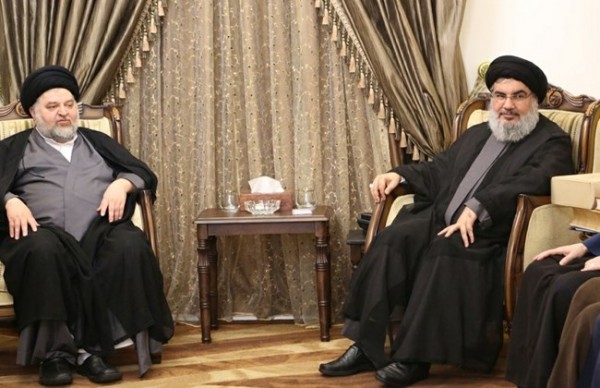
Hezbollah Secretary-General Hassan Nasrallah held talks with Sayyed Jawad al-Shahristani , the representative of Iraq’s top Shiite cleric Grand Ayatollah Ali al-Sistani, according to statement issued by Hezbollah’s press office
The statement did not specify when the meeting took place and where , but said it was held in the presence of senior Hezbollah officials.
Shahristani Thursday met with Speaker Nabih Berri.
The meeting coincides with the visit of Prominent Iraqi Shiite cleric Muqtada al-Sadr to Beirut.
Sadr reportedly arrived in Beirut Sunday , but the nature of his trip remains unclear. However, An-Nahar newspaper said Friday that the Shiite cleric is in Lebanon on a routine visit.
Iraq’s former Prime Minister Nouri al-Maliki is in Beirut too.
Iraq’s parliament canceled a session Saturday to discuss anti-graft reforms, state TV said, as some MPs disputed the legitimacy of the speaker to chair the meeting.
Reports from Baghdad indicate that the Iraqi Shiite alliance has collapsed.
Prime Minister Haider al-Abadi, finds himself increasingly isolated among Iraq’s Shiite political and clerical leadership.
“Abadi’s failures to enact reforms, deliver services and build meaningful political alliances has led to his alienation from the religious leadership in Najaf, which has refrained from its previous statements of support for the government. As Grand Ayatollah Ali al-Sistani stepped back from the political fray, Sadr and former Prime Minister Nouri al-Maliki intensified their bids to replace Abadi. Sadr has also rejected Iran’s mediation and is seeking to ride a nationalist wave of resentment against both American and Iranian interference in Iraqi affairs”, according to analysts
Some analysts are claiming that the presence of Sisistani’s rep, Maliki and Sadr in Beirut is to mend the relations between them and specially Maliki and Sadr and prepare a plan to overthrow Ebadi .
According to Al Monitor’s analyst Ali Mamouri , “Political differences among Shiite parties have moved from disputes among politicians to the street — diplomatic language has changed to direct threats. Sadr called for massive sit-ins in front of the Green Zone, to protest against corruption and government performance. He even embarrassed his Shiite rivals within the alliance. These sit-ins started March 18 and have expanded. Remarkably, Sadr threatened to break into the Green Zone in case the government did not fulfill its demand to replace the current government with a technocrat government. In contrast, the State of Law Coalition [led by Maliki], which represents a majority within the Shiite alliance, issued a strongly worded statement March 16, saying Sadr’s call for protests is illegal and unconstitutional. The statement ended with a warning, or even a threat, that ‘weapons will be faced with weapons, and men will be faced with men. The people, the country, particularly areas that Islamic State [IS] gangs failed to destroy, would be the biggest loser. Resorting to the street is a mistake that will end up destroying the country and community.’”
Mamouri concluded, “All this reveals that the Shiite alliance has lost its political dynamics to resolve differences. The Shiite forces have moved their internal dispute outside the Shiite circles. Besides, traditional forces such as the highest Shiite authority and Iran have failed to mediate and limit the dispute based on common sectarian foundations.”

Leave a Reply
You must be logged in to post a comment.